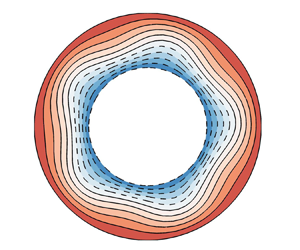Published online by Cambridge University Press: 11 August 2021

This work examines consequences of modelling approximation errors made within the context of the Navier–Stokes–Boussinesq system. Starting from a canonical Boussinesq model, where density fluctuations are allowed to interact with all accelerative terms of the incompressible Navier–Stokes equations in arbitrarily accelerating reference frames, a unified treatment is developed that provides a straightforward way to identify buoyancy forcing associated with gravitational effects, centrifugal forcing associated with frame rotation, as well as centrifugal-type forcing due to variations in flow kinetic energy. The results of the cases studied in inertial, rotating and mixed reference frames demonstrate that in general it may be important to apply buoyancy effects to all non-local accelerative terms, including non-gradient terms such as Coriolis acceleration. Additionally, it is shown that the common practice of ignoring terms representing interaction between density fluctuation and local fluid acceleration can lead to non-negligible error in Boussinesq modelling of highly unsteady flows. These findings have special significance for accurate simulation of flows with density variations in which there may be both background rotation and localised regions of strong swirl, but are also relevant for studies conducted in the inertial frame of reference.